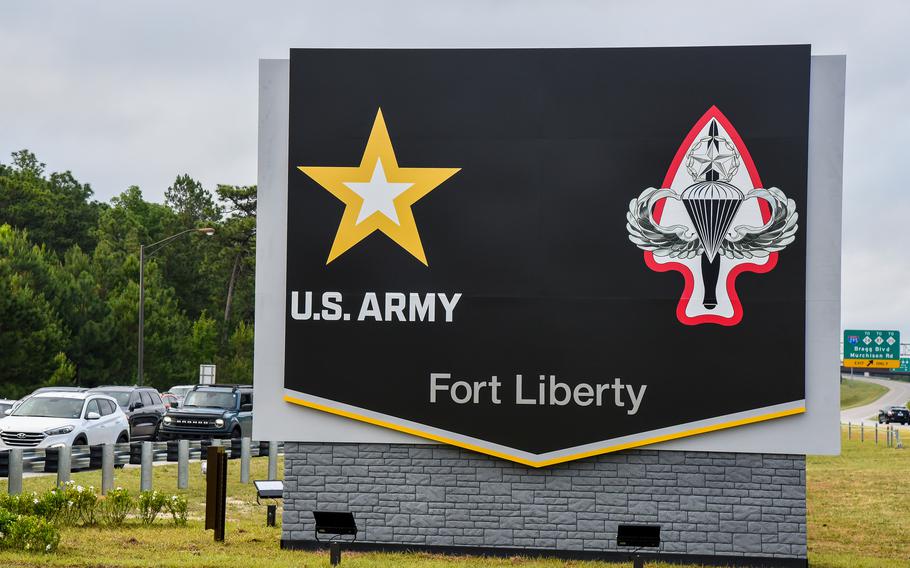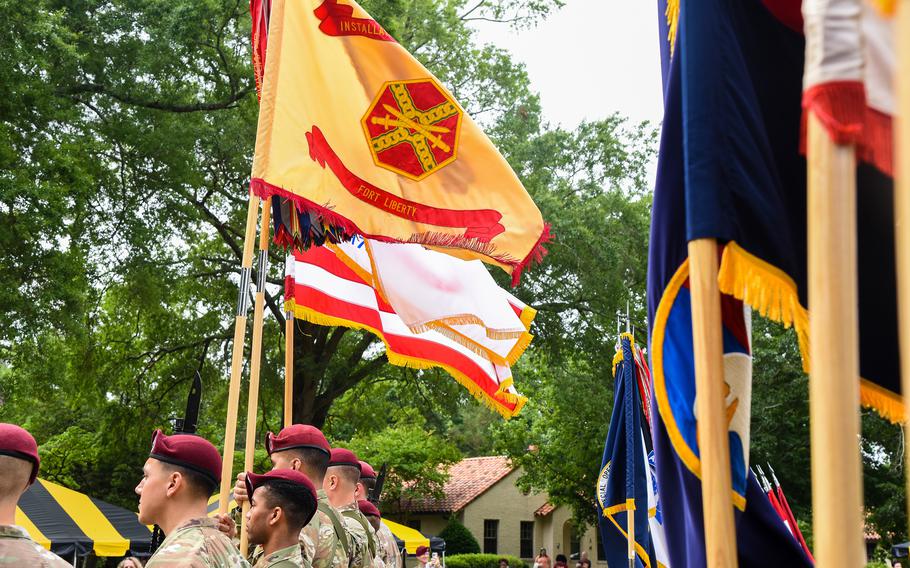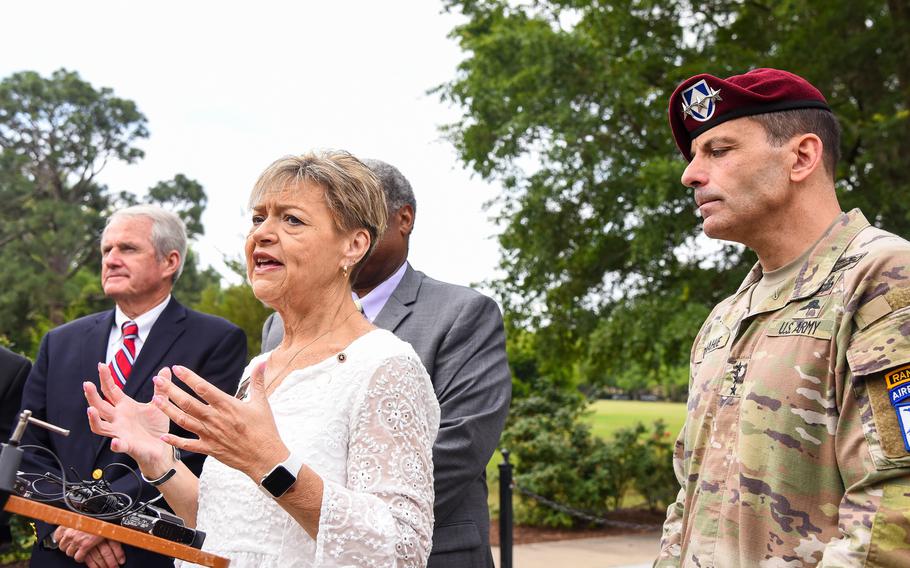
A new sign boasts the name Fort Liberty at the All American Gate at the North Carolina Army installation formerly known as Fort Bragg. The renaming of the storied post occurred Friday, June 2, 2023. (Corey Dickstein/Stars and Stripes)
FORT LIBERTY, N.C. — The U.S. military’s largest base is now called Fort Liberty, as officials at the North Carolina Army post known for more than a century as Fort Bragg gathered Friday to mark the official change.
In an intimate ceremony just off the post’s main parade grounds, Lt. Gen. Chris Donahue, the commander of the 18th Airborne Corps and Fort Liberty, joined Col. John Wilcox, the garrison commander, in unveiling the new Fort Liberty colors. The ceremony marked the latest step in a controversial three-year effort spearheaded by Congress to strip the military of ties to the Confederacy, including the post’s name held since its 1918 inception in honor of Gen. Braxton Bragg.
Donahue, an officer who has spent much of his career at the post and commanded some of its most storied units, noted changing the name was just the Army following orders. But, he said, the name Fort Liberty — named for an American value instead of history makers and Medal of Honor recipients as the other eight Army posts ordered to change this year have done — should inspire those who serve there to aim “to be better.”
“We were given a mission to redesignate our installation — no small task with its history,” Donahue said. “We seized this opportunity to make ourselves better and to seek excellence — as we always have done and always will do.”
Fort Liberty, which stretches across 172,000 acres in eastern North Carolina, boasts a population of some 282,000 people, including 50,000 active-duty service members. Known as the “Home of the airborne and special operations,” it hosts some of the Army’s most-deployed units, including its immediate response force — an 82nd Airborne Division unit tasked with always being prepared to deploy quickly.
The installation is also home to key units such as the 18th Airborne Corps, Army Forces Command, Army Special Operations Command, 1st Special Forces Command, 3rd Special Forces Group, Army Reserve Command, the Army’s most elite unit known as Delta Force and the multiservice Joint Special Operations Command. Officials said the installation boasts the second-largest population of general officers in the world after the Pentagon.

The new Fort Liberty garrison flag flies Friday, June 2, 2023, during a ceremony to mark the change in name of the post formerly known as Fort Bragg in North Carolina. (Corey Dickstein/Stars and Stripes)
To those who have served there, the installation is “the center of the universe,” Donahue said.
Future generations, the general said, will know it as Fort Liberty, a unique name in the Army where most posts are named after war heroes. Donahue said local officials who worked on recommending a new name for the post considered dozens of people known as heroes for the new moniker. Among them were Medal of Honor recipients with ties to the base, such as World War I’s Sgt. Alvin York, and Delta Force operators Master Sgt. Gary Gordon and Sgt. 1st Class Randy Shughart, who were killed in the Battle of Mogadishu in Somalia in 1993.
“Ultimately, any of them could have been chosen,” Donahue said. “A consensus could not be reached on just one. How could you choose any and then leave any of those others behind? There was no right answer.
“There were no names that define what this post is all about.”
As those local officials debated the issue, one local Gold Star mother spoke up in a meeting discussing the name change. Patti Elliott, whose son Army Spc. Daniel Lucas Elliott was killed in Basra, Iraq, in 2011, told the group that Daniel had “died for liberty.”
Name the post Fort Liberty, she urged them.
Elliott, who attended the ceremony Friday, said she was uncomfortable taking credit for the decision, but Donahue and other officials said the name would not have come to fruition without her.
“I'm just an ordinary person put in an extraordinary circumstance and given the opportunity to make a difference,” said Elliott, who serves as North Carolina’s state president for the nonprofit support group American Gold Star Mothers. “I felt that it was important to do something that honored every single one of the thousands and thousands of soldiers who have come through Fort Bragg before and who are yet to come to make us the greatest Army that ever was — the greatest military force in the whole world.
“I'm just honored to have been a small part of that.”

Patti Elliott, a Gold Star mother who came up with the name Fort Liberty, speaks with reporters Friday, June 2, 2023, after a ceremony to officially rename the former Fort Bragg. Elliott’s son, Spc. Daniel Lucas Elliott, was killed in action in Basra, Iraq in 2011. She said he “died for liberty.” (Corey Dickstein/Stars and Stripes)
Fort Liberty is the sixth of nine Army posts to change its name in recent months.
Fort Pickett, Va., Fort Rucker, Ala., Fort Lee, Va., Fort Hood, Texas, and Fort Benning, Ga., have been renamed Fort Barfoot, Fort Novosel, Fort Gregg-Adams, Fort Cavazos, and Fort Moore, respectively.
Fort Polk, La., is scheduled to become Fort Johnson later this month. Fort Gordon in Georgia will become Fort Eisenhower in October. A date has yet to be scheduled for the change of Fort A.P. Hill in Virginia to Fort Walker.
The effort has been a massive undertaking and includes the stripping of Confederate-linked items and names at dozens of other bases and on Navy ships. The Naming Commission, which Congress established in the 2021 National Defense Authorization Act, its annual Pentagon policy and spending priorities bill, estimated the effort would cost some $62.5 million to complete.
The commission expected Fort Liberty’s change to cost taxpayers about $6.5 million, but the effort has already cost about $8 million, said Wilcox, the garrison commander.
That money covers everything from changing hundreds of signs on the installation to registering new websites, he said.
Officials at the post have worked hard to change out signs bearing the Fort Bragg name in recent weeks, Wilcox said. But, it’s likely that some references to the post’s old name remain.
“Look, this is an installation that has been here since 1918,” he said. “We're going to find something that still says Fort Bragg on it. We have done the very best we can to find all the front-facing signage that says Fort Bragg and change it out with Fort Liberty, and we'll continue to identify those and make the changes as necessary.”
Off the installation, references to Bragg remain scattered throughout the local community, where one of the main roads in the city of Fayetteville is Bragg Boulevard and road signs still tout the long-held name of the installation.
The effort almost never happened. Top Army and Defense Department officials, including then Army Secretary Ryan McCarthy and Defense Secretary Mark Esper, signaled openness to stripping the names of Confederates from their bases amid a nationwide racial reckoning after the police killing of George Floyd in Minneapolis on Memorial Day 2020. But then-President Donald Trump vowed the longstanding Army posts would not be renamed, often singling out Fort Bragg for its contributions to every major military action that the United States has been involved in since World War I.
Trump vetoed the 2021 NDAA, citing his opposition to its inclusion of the name changing efforts. Congress overrode his veto, making the name changes law.
Donahue said Friday after the ceremony that despite the name change, it would be Army business as usual going forward at Fort Liberty.
“We do war fighting and we take care of our people,” the general said. “That's what Fort Liberty is. Always has been, always will be.”